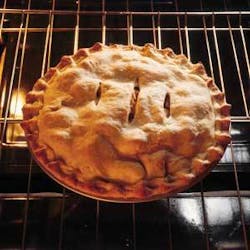When scents make cents
by Andrew M. Goldsmith, DDS
Remember the days when you would come home from school for the holidays? School was intense, and you were tired and ready for solace. It was during that time that there was truly no place like home. Between naps and studying for board exams, you were met with tantalizing aromas of culinary delights from your mother’s attempt to spoil you as much as possible. Perhaps it was the apple pie baking in the oven or the Christmas sugar cookies. Either way, the smells went straight to the pit of your stomach while touching an emotional part of your brain as well. The aromatic ensemble made studying for boards an arduous task, but the fragrance conjured up warm fuzzies inside you.
Now, imagine anxious patients walking into your dental office smelling not bonding agents but sugar cookies. The scent of hot apple pie or sugar cookies baking in the oven is recognizable and heartwarming. Sensory associations at the subconscious level take effect, and for some reason, your patients feel safe, happy, and content. Due to recent scientific advancements and abundant research, we are now able to integrate scent technology into our offices.
Studies indicate that one of patients’ biggest fears is the smell of a dental office. Plus, scents are becoming big business. Companies like Sony, Bloomingdales, Hard Rock Café, and Westin Hotels are successfully using scents to increase sales and give customers a more enjoyable experience. Since dental fears and phobias include fear of the smell of a dental office, combating unpleasant smells in dentistry should be a primary concern.
Dr. Eric Spangenberg’s research shows that ambient scents increase “approach behavior” as well as enhancing evaluations of merchandise and environment. Logic concludes that scents may augment our efforts to improve perceptions of dentistry. Dental phobia support groups often inform their members that an antiseptic smell is unavoidable. But now there is no reason that your office should have an antiseptic smell. If the featured fragrance in your office is dental potpourri, then you definitely need to continue reading.
Results published in the Journal of Comparative Psychology indicate scents “could be a boon to companies” that use them in marketing. Extensive research shows people are less likely to remember sights and sounds than smells. Moreover, after one year, most people remember a smell along with details of the event. Think of all the times you have smelled a perfume or cologne of somebody you once dated. The scent brings forth a surprising flood of memories. In an instant you remember the minute details of your encounters. The physiological reason for this is because the sense of smell is processed in the limbic system of the brain. The limbic system integrates emotion with physical sensations to create memory.
Imagine the power you have in shaping the neurological associations of your patients. Upon entering your office, your guests could be greeted with the typical dental office scent or with another scent that has a fond memory attached to it. Furthermore, the better your office smells, the more likely patients are to return. In a survey of convenience store customers, 76 percent felt that aroma played a significant part in determining which store they chose. Recognizing the correlation here is paramount in that if your office smells good, patients will want to come back. If it does not, then your colleague down the street just got a new patient.
In the business world, scents are hot, and many companies are using this influential tool with great success. Florida Hospital in Celebration, Fla., was experiencing a high degree of last-minute cancellations for MRI appointments. These cancellations became difficult to fill in a timely manner, resulting in decreased revenues for the hospital. In this case, the solution involved many changes including the introduction of scents into the clinic. The transformations in the MRI clinic decreased cancellations by 50 percent.
Bloomingdales wanted to create a separate, unique experience in each department. Distinctive differences in departments would create a memorable shopping experience instead of a generic department store encounter. The baby department uses a baby powder scent, intimate apparel features a soft lilac scent, and the swimsuit department allures visitors with the scent of coconut. As a result, customers at Bloomingdales are more interested in shopping. Bloomingdales has differentiated itself as a market leader.
Hard Rock Hotel at Universal Studios in Orlando is a massive, luxury resort. The hotel had an out-of-the-way ice cream shop featuring musically inspired ice cream. It struggled to generate profits. Hard Rock creatively used the scents of sugar cookie and waffle cone to lure guests to the basement location. As a result, the Emack and Bolio’s Ice Cream Shop observed a sales increase of 45 percent in six months.
The trend of businesses utilizing scents successfully extends to many other companies as well. Westin Hotel’s scent has become so popular that it spawned a retail version of the scent as a candle, diffuser oil, and potpourri.
Research conducted by Dr. Eric Spangenberg, et al., indicates the presence of ambient “good” scents combined with gender-based products leads to improved consumer evaluation of merchandise and environment, as well as increased approach behavior. That is good news for dentistry. Just imagine increased approach behavior toward dentists. Wow! It is incontestably logical that dentists would want patients to have an improved evaluation of visiting their offices. Due to the abundant positive information about scent technology, scent seems to be a perfect fit for dentistry.
We recently introduced dry air scents into our office, and patients noticed instantly. People who walk in our front door are greeted with the warm, cordial scent of sugar cookies. As people walk down the hall, the scent transforms the experience from warm to relaxing with a vanilla-lavender scent.
We are using a system from ScentAir, Inc. (www.ScentAir.com). I first read about this technology while running on a treadmill and looking at the Sept. 15, 2006, issue of Forbes magazine. I was completely absorbed with what I was reading. It was one of those semi-embarrassing moments when you lose your rhythm and almost fall off the machine with lots of people around to witness it. I quickly regained my cadence and tore the article out of the magazine, and that is when my quest began. Since the Forbes article, ScentAir, Inc., has been featured in Time magazine, the London Free Press, on NBC’s Today Show, CNBC, ABC, and NPR.
ScentAir uses patented technology to enhance an environment, communicate brands, and create a memorable experience. Furthermore, the company is doing it well as evidenced by the fact that sales are up by more than four times over last year. ScentAir is clearly the market leader and is undoubtedly making an impact in the retail business sector. The impact of scent on our bottom line is yet to be determined. At this time, it can only be measured by the bountiful comments we have received so far. Our office greeter has tracked the number of positive comments on a tally sheet. We have averaged 12 positive comments a day over a three-week period. Obviously, results like that should have a significant long-term return. I look forward to tracking the numbers relative to cancellations, production, and case acceptance.
It appears that scent technology will play a compelling role in the business of dentistry. The use of relaxing, soothing, warm scents in the dental environment can solve two major business issues for dentists. Scents have been proven to increase sales in other business arenas and they can do the same for dentistry. The use of ambient good scents could decrease the pervasiveness of one of the biggest fears associated with dentists. Major companies are prosperously using scent technology to establish a mood or feeling associated with their products and services. Scent technology is inexpensive, easy to install, and virtually ubiquitous. Dentistry stands to profit from this amazing technology from both a patient-centered approach as well as a profit-centered approach. Utilization of comforting scents in dental offices will raise the public perception of dentistry. Employing scent technology into your dental office just seems to make cents.Andrew M. Goldsmith, DDS, practices in Colorado Springs, Colo. He is a graduate of the University of Nevada, Reno, and Marquette University. He has completed a two-year general practice residency at the University of Colorado. His practice, Esthetic Family Dentistry, offers fresh new scents monthly to clientele. Dr. Goldsmith can be contacted by phone at (719) 528-5577, or by e-mail at [email protected].

